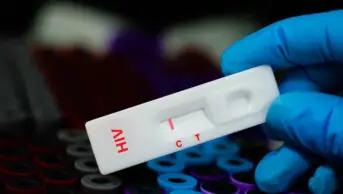
Shutterstock.com
Community pharmacies must be embedded in national HIV prevention strategies to help meet the government’s goal of ending new transmissions by 2030, according to researchers from the University of Bristol.
Their recommendations were based on findings of the ‘Accessing PrEP through pharmacies to improve HIV prevention‘ study, the first pilot scheme providing pre-exposure prophylaxis (PrEP) via community pharmacies in England.
The team — who delivered the proposals in a policy briefing, published on 15 September 2025 — ran the community pharmacy PrEP delivery pilot in five community pharmacies across the Bristol, North Somerset and South Gloucestershire Integrated Care Board between October 2024 and April 2025.
Other recommendations in the report include amending NHS policy to enable pharmacies to stock and dispense PrEP; creating a plan for community pharmacy delivery of long-acting injectable PrEP; and introducing streamlined reimbursement for PrEP consultations to incentivise pharmacy participation.
The researchers confirmed that the pilot scheme has now ended.
The study results, published as a pre-print on 29 July 2025, showed that a total of 55 consultations were held with patients aged 18–69 years (n=23 male, n=31 female, n=1 transgender).
Patients reported emergency contraception (n=14), PrEP (n=14) and opioid substitution therapy (n=11) as the reasons for visiting the pharmacy.
According to the results, 28 patients expressed interest in PrEP; 22 accepted a home HIV testing kit (7 patients returned it); and 4 patients were prescribed PrEP.
“Pharmacists and community members viewed the service positively. Barriers included pharmacists’ initial lack of confidence initiating PrEP discussions and limited public awareness of PrEP availability in pharmacies,” the paper said.
Among their recommendations, the researchers said that pharmacy PrEP pilots should be expanded in the UK to assess scalability, cost effectiveness and equity impact.
In a summary of important findings from the study, the researchers expressed that awareness of HIV and PrEP was low among pharmacists and patients, but pharmacy teams were keen to deliver PrEP.
The researchers also noted a need for training, infrastructure and reimbursement.
Community pharmacies are well positioned to raise awareness and improve access to PrEP, and were valued for their accessibility and walk-in availability, the researchers found.
The researchers added that pharmacies were perceived as “less stigmatising” than sexual health clinics.
Current NHS policy prevents community pharmacies from stocking and dispensing NHS-funded PrEP directly, instead requiring referrals to sexual health clinics to prescribe PrEP, which can cause delays in access, the researchers said.
Jeremy Horwood, co-lead author of the study and professor of social sciences and applied health research at the University of Bristol, said: “Our pilot demonstrates that pharmacy-based PrEP awareness and delivery is both feasible and acceptable. To realise its full potential, we need comprehensive training for pharmacy staff and targeted co-produced campaigns to raise awareness.
“Integrating PrEP into existing public health services within pharmacies offers a vital opportunity to reach underserved communities who may not access specialist sexual health services or lack knowledge of PrEP. The introduction of long-acting injectable PrEP presents an opportunity to further enhance pharmacy-based delivery while easing pressure on sexual health clinics.”
Lead author China Harrison, a research fellow in qualitative and behavioural science at University of Bristol’s Bristol Medical School, said: “PrEP is a powerful tool in preventing HIV, but current access routes don’t reach everyone who could benefit.
“Pharmacies are already part of people’s everyday lives. With the right support, they could transform access and support the government’s goal of ending new HIV transmissions by 2030.”
Commenting on the study findings, Nathan Burley, advanced public and sexual health services pharmacist with NHS Greater Glasgow and Clyde, said: “Further clarity is required on which elements of PrEP care, including regular STI testing and treatment, can be cost effectively provided in pharmacy. As well as models being clearly defined, they need to be seamlessly integrated with other services or fragmented care is a risk. The current cost, some 30 times more expensive to provide in primary care per box of generic emtricitabine/tenofovir disproxil (the mainstay PrEP therapeutic), will not currently be palatable to many commissioners.
“In Glasgow, we have already had success in providing PrEP to patients through community pharmacies, sometimes alongside opioid substitution therapy, as the considerably higher cost of doing so is outweighed by the benefits of reduced risk, such as in people who inject drugs.
“There is an opportunity for an incoming generation of prescribing community pharmacists to take on additional clinical services, especially within sexual health. Further research, feasible model details and cost analyses in the area of pharmacy PrEP would be welcomed.”
Tase Oputu, chair of the Royal Pharmaceutical Society’s English Pharmacy Board, said: “Expanding PrEP access through pharmacy would help reach underserved communities and make a real difference to HIV prevention. Pharmacies are trusted and accessible, particularly for people who may not use sexual health clinics or who face barriers to care.
“To make this a reality, pharmacists must be supported with the right training, clear care pathways and sustainable funding. As the government looks to develop the ‘Neighbourhood Health Service’, we would urge ministers to act on the Health and Social Care Committee’s recommendation to widen access to PrEP via community pharmacy and ensure that this is delivered through the forthcoming HIV action plan.”


